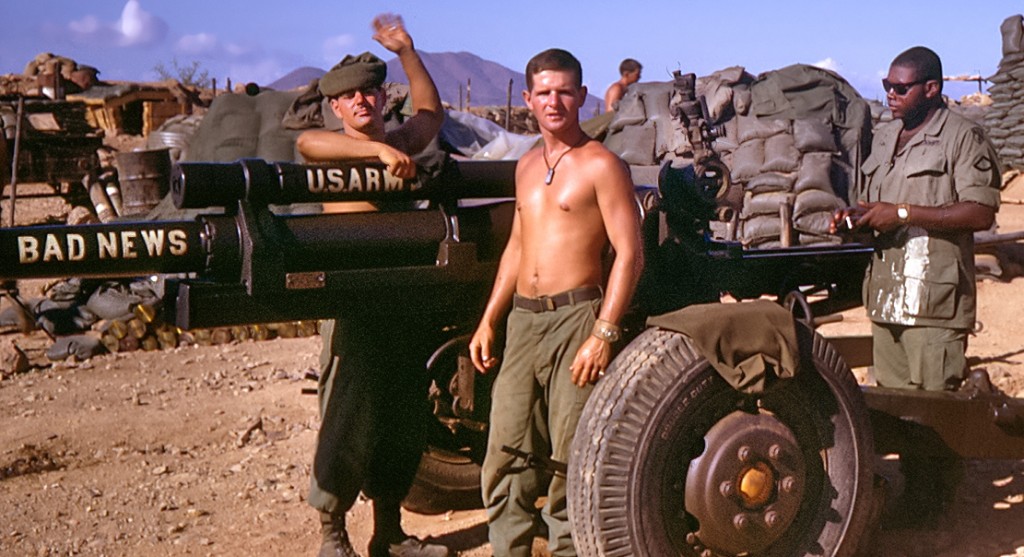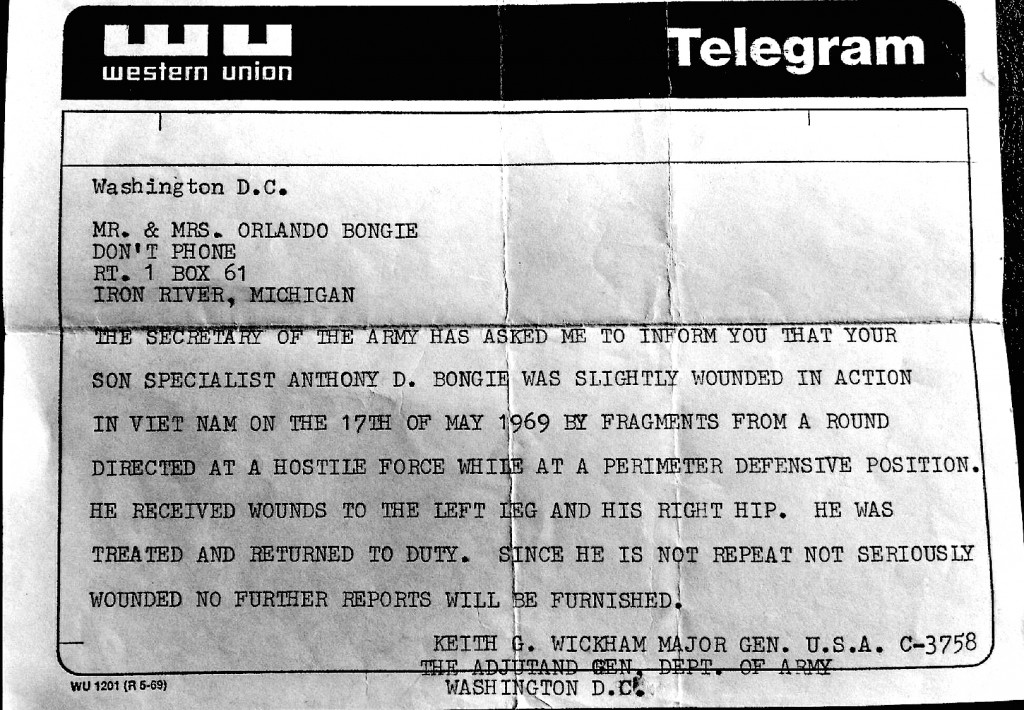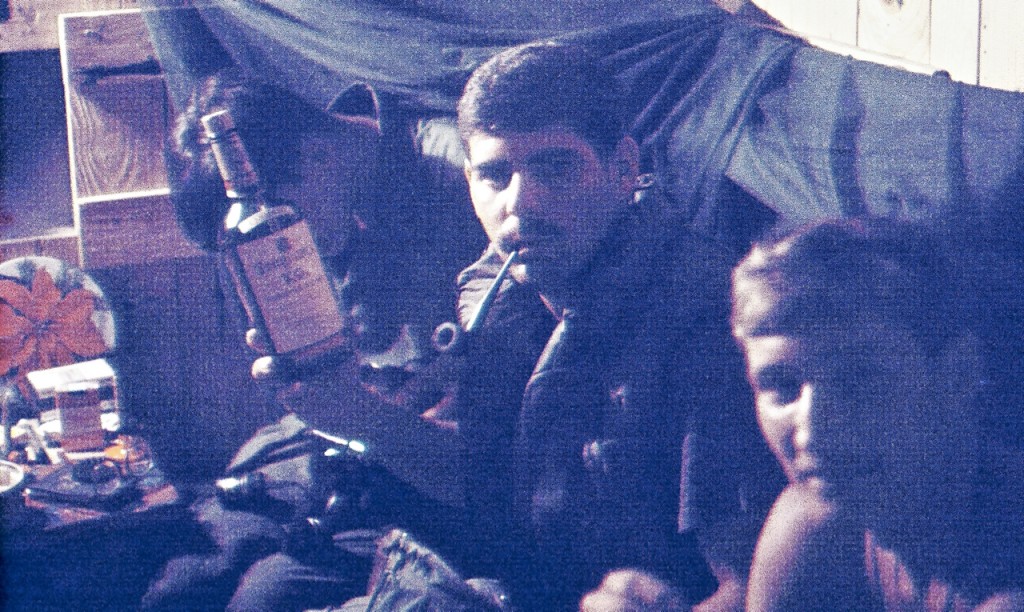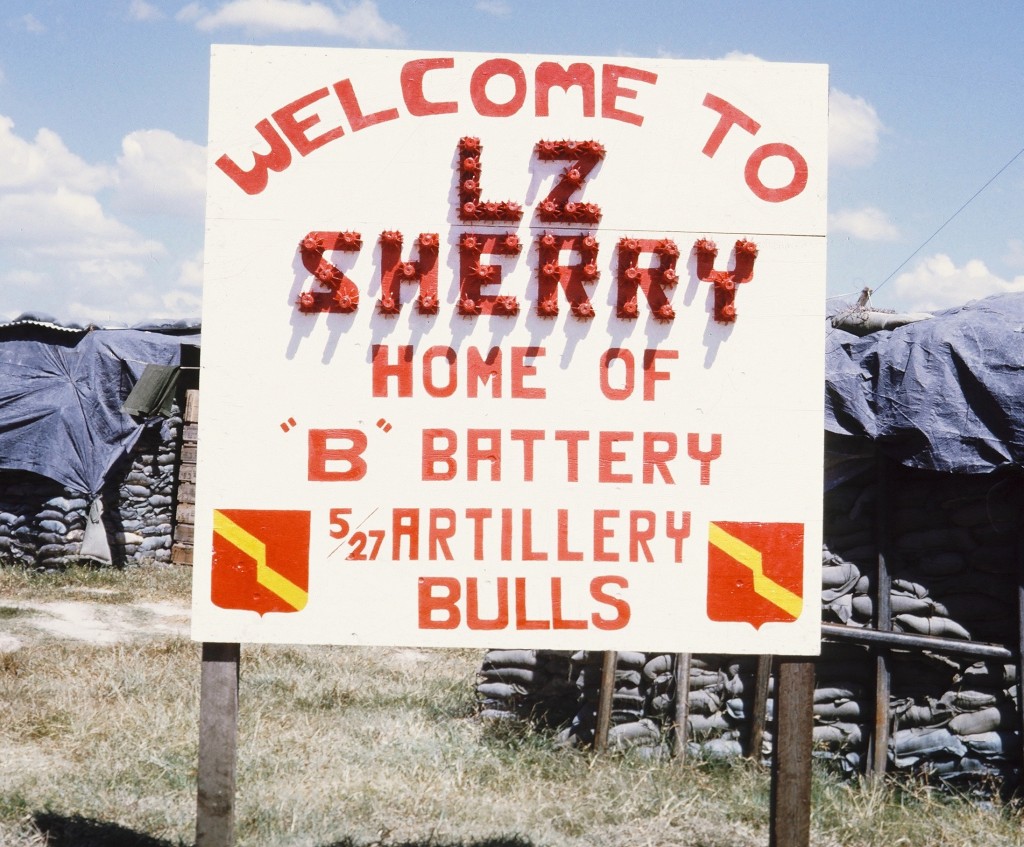Vietnam
I left for Vietnam out of Oakland, California. We flew on a super DC 8 and everybody on the plane was either infantry or artillery. Our first stop was Hawaii. They let us off the plane, and I went into the bar there and met a couple friends and had a couple Mai-tai’s. The whole thing was kind of funny because prior to starting basic they had you fill out a questionnaire and you got an opportunity to select three places where you wanted to serve. I put Hawaii number one on my list. So I got my wish for a couple of hours anyway.
After Hawaii we stopped at Wake Island which was nothing. The next stop was the Philippines at Clark Air Force base. When we got off the plane I could see these oriental looking people walking around, and it really hit me where I was going. Up until then I kind of compartmentalized it in the back of my head. It was about a two hour flight from Clark to Vietnam. We landed at night at Ben Hoa outside Saigon, and I remember sticking my head out the door to this overwhelming smell of dead fish. I could see the artillery in the background and I thought, Oh my, what have I gotten myself into now?
We moved to a holding area and as we are doing this there’s a bunch of guys waiting to get on the plane to go home. They are cheering wildly and here we are just getting there. I remember getting on a bus and the windows had bars on them so people couldn’t throw shit in at you, a grenade of something. I remember being very leery of anyone who looked oriental at that point.
We got processed at Long Binh a few miles away, and from there I took a plane north to Nha Trang. I was there for a couple of days and ran into somebody from college and we had the opportunity to go swimming. From there we went to Phan Rang to battalion HQ, and from there I went out to LZ Betty at Phan Thiet. I’ll never forget the chopper ride from Betty out to Sherry. The chopper clipped along ten feet above the trees. They said we were not so much of a target when we were down so low and could not be shot at easily. By the time they saw you, you were past them.
I was on that chopper out to Sherry with a black guy from Mississippi. Three weeks after we got to Sherry he was on a mine sweep and hit a mine and it killed him. (Percy Gully – April 2, 1969 – along with Steve Sherlock.)
Caught In A Compromising Position
Dick arrived at Sherry in March of 1969, and immediately went on Gun 2, BAD NEWS, where Rik Groves was crew chief. Within weeks Guns 2 and its crew went on a mobile operation to Outpost Nora with one other howitzer. On May 17 when the round with a bad fuse from Gun 2 detonated over the other howitzer and killed two of its crew, Dick and his crew had rotated back to Sherry. He therefore helped to build the outpost, but was not present for the mishap.
I have a funny story from my time at Nora. When we moved there, the first thing we had to do was build the Fire Direction bunker and an ammo bunker, and then we could build our hooches. For quite awhile our latrine was just a hole we had off the side of the berm. I was down there sitting over the hole one day when all of a sudden a sniper started shooting at me. I’m scrambling up the side of the hill with my drawers down around my ankles, and the guys are laughing their asses off at me. They thought it was a riot.
Our perimeter defense at Nora were a bunch of Montagnards. They were there with their families. We would buy ice from them. When we first got there you got a pretty good size piece of ice for the equivalent of a buck. By the time I left you were getting one about a third the size for five bucks. They were good business people. And we had to be able to keep our beer cold after all! I remember we lived mostly on C-rations. They would fly in one hot meal a day. That was one thing about being in the artillery, you almost always got at least one hot meal a day. It was pretty quiet as far as I remember. We went there to support the infantry, but we did not have many fire missions to shoot, and I don’t recall any mortar attacks.
Just a couple months after I got to Sherry, sometime in May, I extended my tour 53 days so that when I got back to the States I’d get out of the Army right away. When you went back to the States if you had five months or less left on active duty they let you out. That was my goal, to get out of the Army ASAP! When I decided to extend my parents were just devastated. But it was pretty quiet when I decided to extend.
The quiet ended soon after Dick extended. The summer of 1969 saw a brutal level of attacks and casualties at LZ Sherry.
Loose One, Win One
I had a girlfriend in college, we had been going together for at least a year, and in basic training at Ft. Jackson I got the dreaded Dear John letter. I took that really hard. It made me angry, and I was already angry. I was hurt, and at that point in my life I expressed it as anger.
When I got to Vietnam I corresponded with a high school buddy who had gone through ROTC and was an officer stationed in Maryland. Rick had met this girl Judy there, and somehow she got to be my pen pal. Judy was wonderful. She wrote me probably five letters a week. These were not just one or two pages, some of them were eight and nine pages long. It was a wonderful outlet for me to express my emotions and frustrations about the war that I did not want to share with my parents. She was a godsend. I lived for mail call. As I recall we had amazing mail service. Letters only took three or four days. As it turned out Rick and Judy got married a week after my wife and I got married.
Convoy Memories
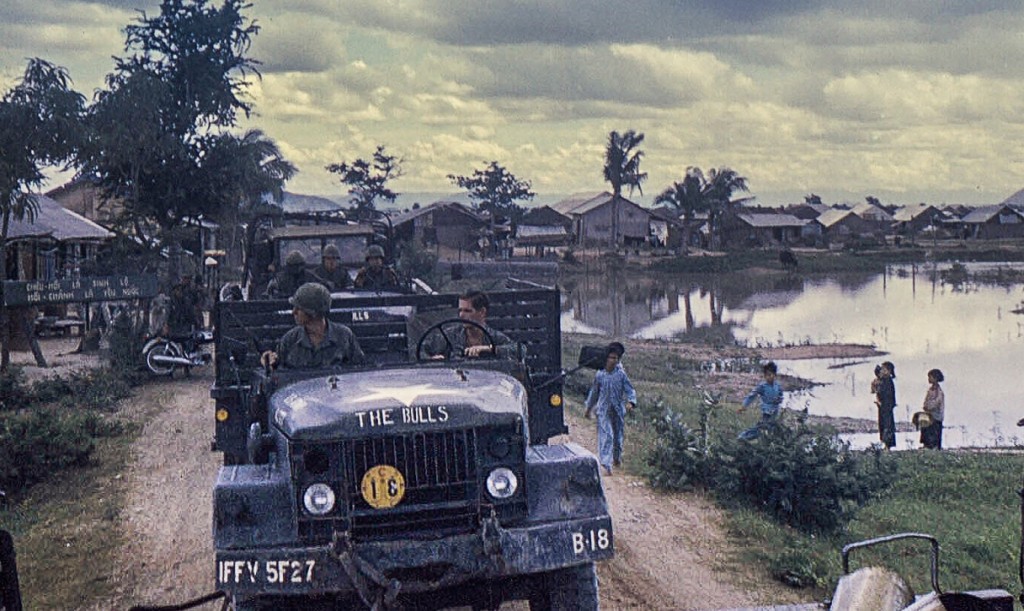
Tommy Mulvihill at the wheel
Going on convoys into Phan Thiet you always had to watch out for your wallet. The kids were begging for money and candy, but they also tried to steal your money. They would come along and try to pick your wallet out of your pocket. One trick was to cut a slit with a razor in your back pocket to get to your wallet. I always kept it in my breast pocket, growing up in New York I knew about this kind of stuff. I’m just grateful we did not have to worry about people blowing themselves up around us.
One time on a convoy back to Betty I got an opportunity to call home. They did that through a series of shortwave radio operators.
The Military Affiliate Radio Service, known as MARS, used phone-patch connections over shortwave radios to place personal calls to the States. The lines outside the MARS stations in rear areas were always long, and it often took forever to make a chain of connections to the other side of the globe. The calls were limited to five minutes, assuming all of the radio connections held that long.
When they rang my parents’ house, wouldn’t you know it, the line was busy.
